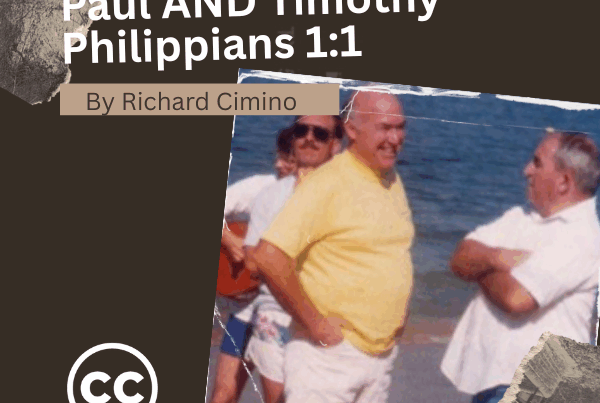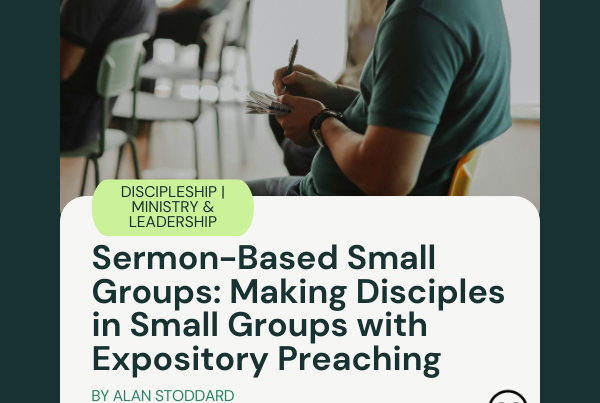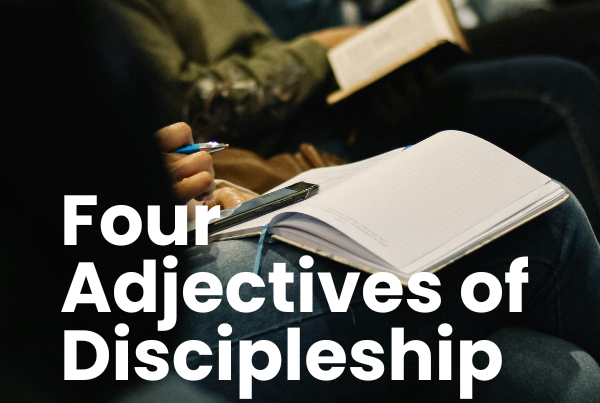
To the choirmaster: according to The Gittith. A Psalm of David. 1 O Lord, our Lord, how majestic is your name in all the earth! You have set your glory above the heavens. 2 Out of the mouth of babies and infants, you have established strength because of your foes, to still the enemy and the avenger. 3 When I look at your heavens, the work of your fingers, the moon and the stars, which you have set in place, 4 what is man that you are mindful of him, and the son of man that you care for him? 5 Yet you have made him a little lower than the heavenly beings and crowned him with glory and honor. 6 You have given him dominion over the works of your hands; you have put all things under his feet, 7 all sheep and oxen, and also the beasts of the field, 8 the birds of the heavens, and the fish of the sea, whatever passes along the paths of the seas. 9 O Lord, our Lord, how majestic is your name in all the earth! (Psalm 8, ESV)
The person this psalm describes is flourishing. It depicts a whole person—they’re humble yet strong; they feel infinitesimal compared to the cosmos yet significant to God; and with self-mastery, they serve and tend to the creation God gave them dominion over.
If you saw this person today, you’d say they were “on fire” or “on the top of their game” or were “crushing” or “slaying it.” This is the mother handling all of life’s complexities with grace and dignity. This is the student navigating a massive course load and completing their objectives. This is the small-business owner who’s serving their employees and customers well, creating a healthy culture in their workplace. This is the retiree whose schedule and life impact the next generation more than ever.
The person described here has dominion over their environment, which is the very thing God intended when he made us (Genesis 1:26-27). He made man and woman to fill the earth and subdue it, exercising dominion over it. So this person is living a whole human experience.
And the bookends of the psalm tell us the secret of how this wholeness came to be. In the first and also the final line of the song, David said, “O Lord, our Lord, how majestic is your name in all the earth!” (1, 9).
Don’t let the way he addresses God pass you by: “O Lord, our Lord” (1, 9). The first Lord is God’s personal name, Yahweh or Jehovah. Later translators and worshippers didn’t want to say his name out loud or write it completely, but David had no such reservations. He knew God personally. The second “Lord” comes from the word Adonai, and it stresses God’s position as master and sovereign. David is saying that he both knew God personally but respected God’s position over his life.
And notice how he rejoiced over the majesty of God’s name in all the earth (1, 9). To say God’s name is majesticdoesn’t mean he thought God’s name sounded interesting—“I just love the name ‘Yahweh.’ So creative! In the Bible, your name was your reputation, your character, you. So David was saying that he loved God’s nature. He loved thinking about and celebrating who God is.
So what we have here is a man who is enraptured with God. By beginning and ending the psalm with the same statement, we learn that the life detailed within it—the life of strength, meaning, and dominion—is a result of the worshipper’s strong connection to God.
Dallas Willard once wrote:
“The ideal of the spiritual life in the Christian understanding is one where all of the essential parts of the human self are effectively organized around God, as they are restored and sustained by him. (It is) the human self fully integrated under God.”
— Renovation of the Heart: Putting On the Character of Christ by Dallas Willard 1
That’s what we’re discovering here in Psalm 8—a person totally organized around God, integrated under God.
But what are the results of this integration? What happens when we love God this way and organize ourselves around him?
Result 1: Strength
The first result is strength. David said, “Out of the mouth of babies and infants, you have established strength because of your foes, to still the enemy and the avenger” (2). Even babies and infants receive God’s strength to face the forces of opposition against God (2). Even crawlers can stand against everything and everyone out of alignment with God. Even the weakest is given strength.
This is the way of God. When you lower yourself under him, when you know him personally, set him as the Lord of your life, and celebrate his nature, you receive strength.
And it’s the way of Jesus to infuse the weak with strength. When he came to the earth, he reached out to the sick, the outcast, the tormented and despairing, and those with the greatest levels of societal shame.
In one instance of such care, after healing the blind and disabled in the temple precincts, little children began crying out, “Hosanna to the Son of David!” The religious leaders were upset that Jesus would allow them to praise him in that way, and Jesus used this psalm to explain what was happening: “Yes; have you never read, ‘Out of the mouth of infants and nursing babies you have prepared praise’?”” (Matthew 21:16, ESV).
It was a fascinating quotation because it put the religious leaders in the position of the foes and enemies this song talks about. They didn’t receive God’s strength because they wouldn’t worship the One in their midst. But the children did. They were enamored, engrossed with Jesus. And this means that, even in their weakness, they were strong.
This is the way of Christ—the weaker you are and admit to being, the more strength you receive.
My father once told me a story about his high school wrestling career. During one match, he had to go up against the state champion in his weight class. Knowing that he had no chance, my dad’s coach told him to do everything he could to not get pinned. He would still lose the match, though not by as much, and therefore the overall team score wouldn’t be as impacted by his loss. In the first period, my dad held his own by doing nothing, sort of lying limp. But in the second period, feeling he was doing pretty well, he tried a move. The next thing he knew, he was pinned. His opponent was waiting for him to think he was strong.
God doesn’t bless human arrogance—thinking we are strong—but a childlike recognition and enunciation of his name. So if you want to flourish, if you want to be a whole person, if you want to enjoy God’s original design for humanity, become as much like a baby or a child as you can.
I don’t mean infantile or childish—immature. I do mean that we ought to develop a childlike—even infant-like—dependence on our Lord. Babies are totally dependent creatures. They can’t meet even their most basic needs. And when we see ourselves in this way, dependent on God for the needs of our body and soul, we’re made strong. But if we don’t see ourselves this way, we’re in danger of removing ourselves from the place God’s power flows.
Result 2: Meaning
The second result of life organized around God is that we find meaning in life. David said, “When I look at your heavens, the work of your fingers, the moon and the stars, which you have set in place, what is man that you are mindful of him, and the son of man that you care for him?” (3-4).
It’s not hard to imagine young David tending his father’s sheep in the wilderness reaches of Bethlehem, staring up at the unpolluted night sky. He spent so much of his time counting sheep during the day; maybe he fell asleep by counting stars. And the grandeur of all he saw gave him a sense of insignificance at first—“I am so small in comparison!”—but he was then filled with awe that God cared for him. Looking up to the stars, David remembered that God was mindful of him and cared for him (4).
We might feel that David had an advantage over us because all that time in the wild surely filled him with these insights. But it wasn’t that David’s time in nature inevitably made him a worshipper—billions of people have looked at the stars without submitting to God. But because David already knew God, when he felt his insignificance in the darkness, he was reminded of God’s unbelievable care for him.
And we do have an advantage over David. We might live in cities that sometimes obscure the glories of the natural world, but we’re a more scientifically advanced people than during David’s day. We know the staggering distance and size of the sun, moon, and stars—and so much more. And with each successive discovery, we seem to learn of our relative smallness in this ever-expanding universe (Isaiah 42:5, 44:24, 45:12; Jeremiah 10:12, 51:5).
But, for the person properly aligned with God, organized around God, this smallness reminds them of his care. Some call this the “paradox of man,” that though we are like a speck of dust within this vast universe, God has bestowed dignity and importance upon us. He cares for us.
In Wendell Berry’s book Jayber Crow, the main character described his love interest’s look by saying, “the brief, laughing look that she had given me made me feel extraordinarily seen, as if after that I might be visible in the dark.” 2
This is what the psalm describes, that even though we’re but a dot in the expanse of God’s creation, we’re extraordinarily seen by God, visible in the dark to his loving eyes. Though we’re conscious of our relative insignificance, he’s the one who diffuses us with significance and meaning.
Result 3: Dominion
The final result of this life organized around God is dominion. David said, “Yet you have made him a little lower than the heavenly beings and crowned him with glory and honor. You have given him dominion over the works of your hands; you have put all things under his feet,” going on to list various animals of land and sea (5-8).
All this recalls the creation account of Genesis. On the sixth day, God said he made men and women in his image to:
“’…have dominion over the fish of the sea and over the birds of the heavens and over the livestock and over all the earth and over every creeping thing that creeps on the earth.’”
(Genesis 1:26–27, ESV)
So God made us to exert dominion over our surroundings, not as tyrants, but as servants. We were made to tend and cultivate the earth for our benefit, not as abusers but as stewards. In a sense, he put us in charge. We were meant to lead and cultivate the earth from raw material to beautify society.
We’re God’s special creation. It’s a position, David said, of glory and honor (5). But note how the psalm states it: we are a little lower than the heavenly beings while also being above the animal kingdom—they are under our feet (5-6).
And life in proper alignment with God gets this right. It doesn’t seek to advance itself above God, nor does it lower itself to a life of animalistic impulse. Instead, it’s conscious of its place beneath heaven but above the rest of creation.
In Luke 15, Jesus told the story of two sons. One took his inheritance early and lived wildly until he was so broken by life that he found himself lower than the pigs he was hired to feed. He returned home with the hope that his father would let him be a household servant. When the father ran to receive him and threw him a great feast, the older brother was disgusted and challenged his father.
Both were out of alignment with their true position. The first lowered himself to be like the animals. The second exalted himself above the father. The first lived by his animalistic desires. The second thought himself a god.
But when we’re in proper worship and love for God, we regain our proper position. We aren’t like the animals. Nor are we more intelligent than God. We’re in the middle—below him and above creation.
Christ
The man or woman who is properly aligned to God, who has organized themself around God, has everything they need to become a whole person. They are living in their proper place, both body and spirit alive and functioning as God has designed.
It’s here some introspection is required. Who is the man or woman in total self-control? Who operates with continued humble strength, purposeful significance, and gentle dominion?
The book of Hebrews even pointed this conundrum out. Speaking of us, it says:
“’You made him (humanity) for a little while lower than the angels; you have crowned him with glory and honor, putting everything in subjection under his feet.’ Now in putting everything in subjection to him, he left nothing outside his control. At present, we do not yet see everything in subjection to him.”
(Hebrews 2:7-8, ESV)
What this passage tells us is that even though God gave us dominion over his creation, right now it sure doesn’t look like it. Though we were made for humble strength, purposeful significance, and gentle dominion, we don’t have the dominion God made us to have.
The creation wars against us. Other people make decisions, commit sins, and neglect responsibilities that hurt us. Our lives, schedules, and circumstances often overrun us, and we experience anything but dominion. Even our own bodies rebel against us.
Though our psalm today might echo God’s intention for humanity in Genesis 1, we know the catastrophe of Genesis 3. Through sin, we lost our dominion. None of us lives completely in the realm this psalm portrays.
Except for Jesus. He referred to himself often with the same title this psalm gives us—the Son of Man (4). This is where the Hebrews passage helps us. It continues:
“But we see him who for a little while was made lower than the angels, namely Jesus, crowned with glory and honor because of the suffering of death, so that by the grace of God he might taste death for everyone.”
(Hebrews 2:7–9, ESV)
This means Christ came and fulfilled humanity’s destiny. He regained dominion. And anyone who trusts in him enters into his new version of humanity—and is, therefore, able to progressively regain the dominion that we lost. It’s through Jesus we become whole, more human than ever before. In him, our out-of-control and untamable species can regain the self-control and dominion we were meant to have.
In the classic book The Little Prince, a boy from another planet comes to visit the earth. While here, he meets various animals and people, and one of them is a fox. Having never seen a fox, the Little Prince asked him about his life.
“‘My life is monotonous. I hunt chickens and men hunt me. All chickens are alike and all men are alike. So I get a little bored. But if you tame me, my life will be full of sunshine. I shall recognize the sound of a step different from all others. The other steps send me hurrying underground. Yours will call me out of my burrow like the sound of music. And look yonder! Do you see the cornfields? I do not eat bread. Wheat is of no use to me. Those cornfields don’t remind me of anything. And I find that rather sad! But you have hair the color of gold. So it will be marvelous when you have tamed me! Wheat, which is also golden, will remind me of you. And I shall love the sound of the wind in the wheat…’ The fox became silent and gazed for a long time at the little prince. ‘I beg of you… tame me!’” — The Little Prince 4
The fox is like us in our natural state—untamed and without purpose or passion or meaning. We need Christ to tame us, to diffuse our lives with significance and meaning. We need him to enter our lives and transform us from within.
Only Jesus can lead us into the wholeness we crave. Only he can reproduce the gentle dominion we were made to experience. Only he can make us thrive. Only he can tame us.
References
[1] Dallas Willard, Renovation of the Heart: Putting on the Character of Christ (Nottingham, England: Inter-Varsity Press, 2020).[2] Wendell Berry, Jayber Crow (Berkeley: Counterpoint, 2001).
[3] Rick Warren, The Purpose Driven Life: What on Earth Am I Here For? (Grand Rapids, MI: Zondervan, 2012).
[4] Antoine de Saint-Exupery, The Little Prince, ed. Joy Cowley (Strathfield, NSW, Australia: Big and Small Publishing, 2016).







